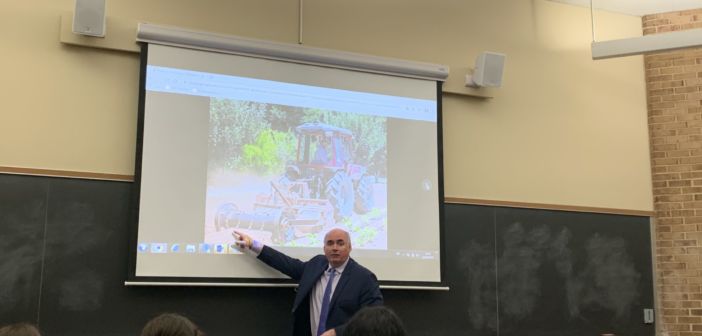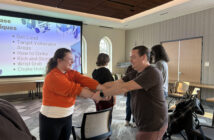Kevin Cassidy, the director of the International Labor Organization, presented the “Dignity of Work” through personal stories and photographs taken by the award-winning photographer and author John Isaac on Oct. 22.
Through the slideshow and presentation, Cassidy said he hopes students will understand the importance of his work.
“The reason we did the photographic backdrop is to show that there are people in all walks of life that may be invisible to us, but they are important to our everyday lives,” Cassidy said. “Our lives are impacted by thousands of people we may never, ever, meet, but these people form a very important part of our social landscape.”
He said he hopes people will be able to learn from his experiences and personal stories.
“I love speaking to people,” Cassidy said. “And I hope the people I speak to can take some lessons from my travels, and others that I’ve been in contact with.
He said because students are in the phase of preparing for their future careers, he wants them to consider a few things.
Cassidy asked the students, “Why are you going to school? Why are you spending your time and all this money on getting an education? How will you apply your skills and gifts to others?”
He says he wants students to be aware of their choices and the opportunities they have to positively change their life trajectories.
“I want people to feel empathy for others,” Cassidy said. “If you feel compassion for others, just imagine you can help them through bad times and help change someone’s life.”
The second thing Cassidy wants students to understand is that, like everyone else, they have rights.
“We want you to understand that you have (inalienable) rights as human beings on this planet,” Cassidy said. “Regardless of where you come from, regardless of what gender you are or what identify you have.”
He believes it’s important for people to understand how change can promote fairness.
“In our human rights approach, the world of work is an important way for people to change their way of life,” Cassidy said. “You can do a lot with a good job, and we believe that by having a good job, by treating people like human beings in the workplace, by paying them well — that actually contributes more to society.”
Morolake Tomoye, ’23, said looking at the photographs and hearing the stories behind each profile was inspiring.
“The labor force is real people and you can’t just view them as statistics, and at the end of the day, treat everyone you meet with respect,” Tomoye said.
Tomoye said this mindset was conveyed quite well in the pictures.
She said the presentation also gave her insight into the endless possibilities of professions that are out there.
“A lot of students are thinking about what they want to do with their lives and what type of professions they want to engage in, so it’s important that students know there are many different options and you don’t have to limit yourself to a specific career track,” Tomoye said.
Joshua Rutzick, ’21, said it’s important for students to know which career options are available.
“The students at Lehigh University tend to move on to relatively high-paying or white-collar jobs, and it’s interesting to learn about the different types of work that people do in the world things that you might not otherwise hear about or think about,” Rutzick said.
He said the personal stories were thought-provoking, especially when people are adapting to the evolution or disappearances of jobs due to technological change.
Cassidy says he meets a lot of people through the ups and downs of the workforce, but he takes inspiration from what people do to change their lives.
“Sometimes life can be easy for us, sometimes life can be difficult, but I think the most important thing is that not everybody has it the same way,” Cassidy said. “And we want to ensure that people are actually treated fairly.”






Comment policy
Comments posted to The Brown and White website are reviewed by a moderator before being approved. Incendiary speech or harassing language, including comments targeted at individuals, may be deemed unacceptable and not published. Spam and other soliciting will also be declined.
The Brown and White also reserves the right to not publish entirely anonymous comments.